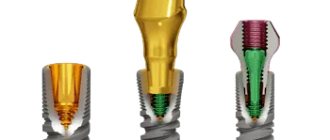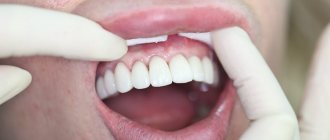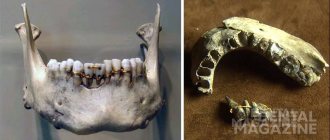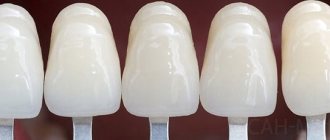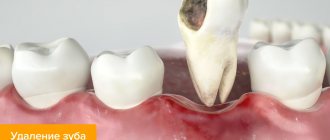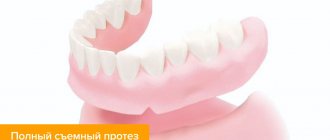- Is the implant made of medical grade titanium?
- Is there an allergy to titanium?
- The implant may not take root...
- Implant for life?
- Which implant company should I choose?
- Is implantation painful?
- Are there any contraindications to implantation?
- How many implants can be placed at one time?
- Can I drink alcohol after dental implants?
- Is sports possible after dental implantation?
- How much does dental implantation cost?
- Dental implantation - tips for preparing before surgery.
- What to choose - anesthesia or pain relief?
- Dental implantation – recommendations during surgery.
- Recommendations after dental implantation.
- Possible consequences after implantation.
In this material we will try to discuss in detail frequently asked questions from patients and give detailed answers and advice to them.
Is there an allergy to titanium?
There is no allergy to titanium; moreover, not a single case of allergy has been recorded in the world so far.
If you have allergies to metals or other substances, you need to pay special attention to the stage of prosthetics. The implant itself is certainly made of titanium, but the orthopedic components (abutment, gum formers, screws and crown frames are made of other metals or metal alloys containing titanium.
Therefore, before starting treatment, discuss all the nuances with your dentist. If necessary, all components can be made from either titanium or zirconium dioxide, both of which are bioinert.
General characteristics
Most materials used to make high-precision replacement crowns are expensive. Titanium crowns installed on teeth are biologically compatible with the human body, the same as gold, eliminating the possibility of an allergic reaction.
The use of titanium in prosthetics has become widespread - the material makes it possible to create practical and reliable structures, both removable and permanent. The functionality of titanium crowns allows their use as supporting, aesthetic, protective and restorative elements.
The implant may not take root...
To begin with, let’s understand that an implant is a non-living structure, so it cannot take root anywhere.
The body may not notice it and due to mechanical retention in the bone tissue it is retained. In other words, the bone does not see the implant and during the healing process tightly covers it (the implant). Yes, indeed, in Russian and world practice, about 0.05% of all installed dental (dental) implants are not integrated.
Moreover, I will say that the number of complications directly depends on the implant manufacturer, the qualifications of doctors, equipment, and on the patient himself.
With proper planning of the operation, the correct choice of dental implants, and the final result, you can guarantee a 100% result for life.
Implant selection criteria
Material characteristics are a very important component of the implantation system. But dental implants made from the same material, manufactured by different companies, or even by the same company - but in different “lines”, can be very different. The success of restoration also depends on the following aspects:
- the implant must be standard, manufactured at a factory: production is carried out using milling, intense plastic deformation (a rarer type). Individual structures made in a regular dental laboratory are not recommended for installation, because their service life is short (about 7 years),
- shape of the structure: now the best are considered to be root-shaped and cylindrical,
- type of thread: it can be sharp with the ability to self-cut, it can be compression - compact the bone tissue around itself,
- surface: it can be smooth and polished by a laser, or rough - processed in an electrolyte solution or using sandblasting. Active substances that stimulate the growth and restoration of bone tissue cells - fluorine, calcium, phosphorus and others - are also applied to the surface.
- sterilization: modern technologies at the production stage allow for 5-stage treatment to remove impurities,
- a correctly selected model for a specific clinical case: therefore, before implantation, patients undergo tests and undergo a computed tomography scan of the jaw. This way, the doctor can identify important features (for example, changes in hormone levels, the presence of inflammation, atrophy of the jaw bone) and choose an implant based on the indications. And in his choice he is helped by 3D planning in a computer program, for example, Simplant, NobelClinician,
- a good implantologist: this item can be put at the top of the list, because the success of implantation depends on the professionalism of the doctor and his responsible approach to the matter.
Can I drink alcohol after dental implants?
It is strictly forbidden to drink alcohol before and after surgery. Alcohol can greatly change the rheological properties of the blood, which in turn can lead to significant swelling or prolonged bleeding with a risk to life. A person in a state of alcoholic intoxication is not attentive and cannot soberly assess the situation and make decisions. Plus, being unable to accurately remember the doctor’s recommendations will all lead to unpleasant complications. Smoking causes burns to the mucous membrane and disintegration of blood clots; moreover, smoker’s dental plaque greatly worsens oral hygiene.
Dental implantation – tips for preparing before surgery?
- It is better to schedule the operation in the morning. The body is full of vital energy in the morning and easily experiences stress. Believe me, even just a visit to the dentist is stressful for some people. After surgery, you may experience pain that will go away after a few hours. If the operation takes place in the morning, then by the evening the pain will completely disappear and you will go to bed peacefully. In the morning, not only are you full of strength and energy, but so is your doctor. The doctor is not tired yet and is ready to devote maximum concentration of attention and time to the procedure. In case of any complications, you can easily go to the clinic, rather than looking for a 24-hour clinic with sleepy doctors at night or going to an ambulance.
- Eat before implantation surgery (if sedation or anesthesia is not planned) A well-fed person can tolerate stressful situations much easier. After eating, the body releases hormones that help you relax. Concentration decreases a little and you don’t really think about the procedures that the surgeon performs. More busy digesting food. A well-fed person's blood clots better than a hungry person's. This can greatly help to avoid unpleasant complications in the postoperative period.
- What to take before implantation Before the operation, the doctor will definitely inform you about all the medications that need to be taken before implantation. If you are very worried, you can use mild sedatives - valerian tincture, motherwort tincture, etc. Or the same drugs only in tablet form, for example Tenoten. If a long-term surgical intervention is planned, for example, a bilateral sinus - lifting with one-stage implantation, bone grafting, it is reasonable to use non-steroidal anti-inflammatory drugs with a pronounced anti-inflammatory or analgesic effect, antibiotics, antihistamines. It is better to entrust the choice to your attending physician about which drug to take.
- A good mood is the key to successful treatment. Remember that a good positive attitude will shorten the recovery period and help you overcome surgical procedures more easily.
Precautionary measures
- Installation of implants, suprastructures, orthopedic structures with metal components made of homogeneous material.
- Choose a clinic that can provide certificates for all materials and components used.
- Install implants from the same manufacturer. Some clinics offer to select designs from different brands to reduce the cost of treatment. However, such savings threaten even greater financial expenses. You can't agree under any circumstances.
- Install crowns made of hypoallergenic, bioinert materials - precious metals, zirconium oxide, which do not cause oxidation or other negative reactions.
- Be sure to inform the doctor about the presence of metal structures (pins, inlays, endoprostheses) already installed in the oral cavity.
What to choose - anesthesia or pain relief?
Local anesthesia is almost universally used in dentistry.
All modern anesthetic drugs are non-toxic and hypoallergenic, provided they are selected correctly. Anesthetics used in private dental clinics are absolutely safe.
Modern anesthetics can provide complete absence of sensation in the oral cavity for a long time, up to 5 hours. Thereby making the patient’s stay in dentistry comfortable. As an example, many patients fall asleep during dental appointments thanks to good anesthesia.
“Anesthesia doesn’t take me away!”
Every dentist has heard this. The anesthetic affects all people the same. If the anesthesia does not work (does not take effect) on you, then the doctor does not have the proper skills in administering anesthesia.
It is not possible to become infected with infectious diseases during the administration of anesthesia. In private dental clinics, a special carpule syringe system is used, which completely eliminates contact of the solution and needle with the environment and even with the syringe itself.
Anesthetics, if chosen correctly, do not affect the fetus during pregnancy and do not affect the composition of breast milk in nursing mothers.
The quality of anesthesia can be affected by long-term use of non-steroidal anti-inflammatory drugs with a pronounced analgesic effect (painkillers), narcotics
Anesthetics are not addictive.
Dental implantation - recommendations during surgery.
There are a lot of dental implantation techniques and the choice of technique directly depends on the tooth and the situation in the oral cavity. In addition to the dental implantation itself, the doctor must also ensure a comfortable stay during the process.
- Do not hesitate to talk about your unusual sensations, this may help the surgeon during the operation.
- Do not endure the pain, in modern dentistry there is a sufficient amount of anesthetics and, if necessary, the doctor will add anesthesia.
- During the removal process, you may feel pressure or crunching. The doctor will warn you about this in advance.
- The operation time depends on the qualifications of the surgeon and the initial situation, on average 15-30 minutes.
- After the operation, the dental surgeon will apply stitches. The sutures are removed within 7-14 days, depending on the initial situation. In our practice, we try to use self-absorbing sutures less often, since the healing results with these sutures are worse, and the resorption time is very long (20 days), so the sutures still have to be removed.
- A gauze swab is not always placed as prescribed by a doctor.
Term of use
The duration of operation is affected by:
- compliance with the surgical protocol of the operation;
- level of biocompatibility of the material;
- shape, surface of the implant;
- load conditions;
- quality of manufacture and installation of the prosthesis;
- compliance by the patient with the rules of oral hygiene, etc.
On average, the service life is 5-10 years. If all medical recommendations and hygiene rules are followed, implants can last up to 25 years.
Manufacturers of premium implant systems provide a lifetime warranty on their products.
Recommendations after dental implantation.
- You should drive with caution if you have had several dental implants installed or have undergone reconstructive procedures (for example, sinus lifting, bone grafting). Stress can lead to loss of alertness. It is not uncommon for patients to fall asleep while driving after surgery. In case of a complex operation, if necessary, arrange for support in advance.
- Ask your dental surgeon for your mobile phone number and clinic number for emergency contact with your doctor. It is always faster to receive first-hand information if something bothers you after the operation or you simply have a question. Avoid drinking drinks for about 2 hours after implantation until the edges of the wound stick together.
- Do not eat until the anesthesia wears off. Otherwise, during the chewing process, you can damage healthy tissues that, under anesthesia, are not sensitive to injury.
- Eliminate coarse, spicy, salty, hot foods from your diet. This food negatively affects healing and can also cause discomfort at the implantation site and even pain.
- Gentle treatment of the surgical site. That is, avoid chewing on the implantation side and do not touch the wound or threads with your tongue. In other words, create peace at the operation site.
- Do not pick or clean the wound yourself. Even if you see something unusual, contact your dentist. Do-it-yourself activities can lead to complications that take a very long time and are difficult to treat!
- Self-medication, warming compresses, and so on are strictly prohibited.
- You can brush your teeth in the first days after surgery, the only rule is to avoid the surgical area. Avoid strong rinsing movements in the mouth for 2-3 days.
Indications for installation
The use of implants must have a strict justification. Data from a general medical history and a conclusion about the state of oral health are taken into account.
The indications are highlighted:
Are common:
- high quality jaw bone at the installation site;
- sufficient volume of mucous membrane;
- gag reflex, allergy to removable denture materials;
- psychological discomfort during classical removable prosthetics;
- patient's conscious attitude towards oral health.
Individual:
- defects of the end teeth in a row on one or two sides, in which, with the help of implantation, permanent prosthetics become possible in the future;
- the absence of several chewing teeth, their incorrect position over a large extent (from 3 units);
- one lost tooth, and the patient’s reluctance to prepare neighboring ones to install a bridge;
- atrophy of the alveolar ridge due to impaired fixation of removable dentures;
- complete edentia, especially with insufficient height of the alveolar ridge;
- malfunction of the facial muscles and pain due to the lack of functional occlusion.
Possible consequences after implantation:
Remember! In 90% of all complications after implantation, the cause is non-compliance with the doctor’s recommendations!
Dental implantation surgery is primarily an operation and the following local and general manifestations are a variant of the norm:
- Pain This is a normal manifestation after large volume operations. Pain usually occurs on the first day and stops until 8-10 hours after surgery. In rare, difficult cases, the pain may last for several days; in such cases, the doctor must prescribe painkillers.
- Swelling Swelling of the operation site, cheeks, lips is normal in the first three to four days. The severity of swelling depends on the extent of the operation and the state of health. Remember, swelling may appear only on the second day after surgery. That is, on the first day it may not be there, but on the second day it will grow. Don't be alarmed - this is completely normal. It will pass by 3-4 days. In some cases (in case of complex operations) it can remain for up to 5-6 days. In any case, control your condition; at the first doubt or concern, contact your doctor.
- Bruise A hematoma or bruise may appear and this is also a normal option for the postoperative period. The causes of hematoma are high blood pressure, pronounced vascularization of the operation area, extensive surgery, taking anticoagulants, blood thinning drugs (ThromboAss, Warfarin, cardiomagnyl, and so on). The bruise may appear the next day, maybe on the 5-6th day; after it appears, it will turn yellow and slowly go down to the neck, then to the chest. Don't be alarmed - this is the norm.
- Temperature Increase in body temperature in the first two days after implantation to 38 degrees Celsius - this may be normal. Temperatures generally rise in the evening. This is due to two reasons: 1 - associated with post-operative inflammation, indicating that the body is struggling with the resulting injury. 2 - associated with the ingestion of one's own blood; blood entering the digestive tract causes a mild fever. Monitor your body temperature and contact your dentist if there is any deviation.
- Sore throat - the mouth is difficult to open. A sore throat after dental implantation and difficulty opening the mouth are a common occurrence after complex reconstructive interventions. This is caused by swelling that has spread to the masticatory muscles, lymph nodes or tissue spaces of the neck. By day 3 the situation usually improves. If there is no subjective improvement, contact your dentist immediately.
- A short-term deterioration in well-being in the form of headaches and weakness is usually the body’s reaction to a stressful situation. Whatever you say, it’s still an operation and the body reacts to it accordingly.
How to install
Implantation is performed in stages:
- Preparatory (takes from 3 days to 2 months) : Sanitation of the oral cavity and treatment of diseased teeth.
- Laboratory tests to identify contraindications.
- X-ray and computed tomography. Panoramic photographs make it possible to see hidden pathologies, study the size and quality of the jaw bone. The location of the implant is determined.
- Drawing up a treatment plan.
- An anesthetic is administered.
